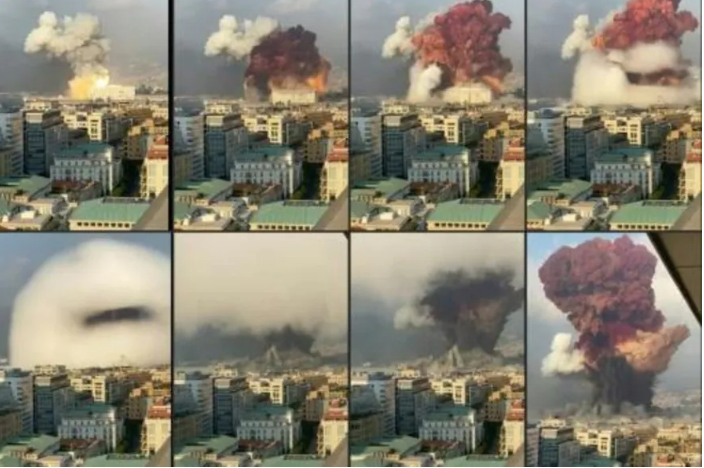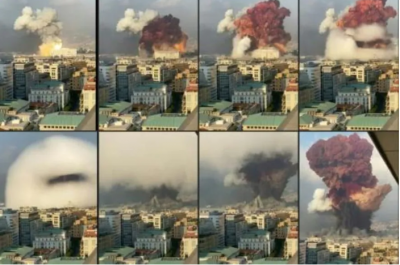A year has passed since the Beirut port explosion, which changed the face of the city and claimed more than two hundred lives, leaving thousands injured and traumatized, without revealing the causes or holding those responsible accountable, particularly due to political obstacles impeding the investigation. On August 4, 2020, a fire broke out at the Beirut port, followed by a massive explosion at around six minutes past six (15:00 GMT), the echoes of which reached Cyprus, causing enormous destruction in the port and most of the eastern neighborhoods of the Lebanese capital, ripping out countless doors and windows in the city and its suburbs. Authorities attributed the explosion to 2,750 tons of ammonium nitrate stored since 2014 in warehouse number 12 at the port.
In a country that has witnessed numerous assassinations, bombings, and various incidents over the past two decades with rarely any revealed or perpetrators held accountable, the Lebanese people—especially the families of the 214 dead and more than six thousand wounded—are still waiting for answers to their questions: Who brought this massive quantity of ammonium nitrate to Beirut? Why was it left for seven years in the port, and who knew about it and its dangers? What was the spark that caused one of the largest non-nuclear explosions in the world?
Judicial sources confirm that the bulk of the investigation has concluded. However, political immunity and permissions currently obstruct summonses for former ministers, members of parliament, and heads of security and military agencies who were aware of the dangers of storing enormous amounts of ammonium nitrate at the port but failed to take action to remove it. A judicial source familiar with the case told AFP that the investigating judge Tariq Bitar "has completed more than 75 percent of the confidential investigation… and the picture of what happened is almost clear before him," adding that he hopes to reveal the results of his investigation before the end of the current year.
Lawyer Youssef Lahoud, a representative of the bar association and more than a thousand victims in the case, explained to AFP that "the Lebanese judiciary has determined the responsibilities regarding who brought the ammonium nitrate to Beirut, the reasons for its unloading, how it was stored, and the decision not to destroy or re-export it until the explosion occurred." However, he adds that "fundamental questions have not been answered yet, primarily how the explosion occurred and whether there are hidden figures regarding those responsible for bringing it to Lebanon."
The ammonium nitrate shipment arrived at the Beirut port in November 2013 aboard the ship "Rhosus," which was en route from Georgia to Mozambique. Reports regarding the reasons for its halt in Beirut vary, but Lebanese judiciary issued an order to seize it following a lawsuit filed against it by a Lebanese company over unpaid dues. In 2014, the cargo was unloaded and stored in warehouse number 12 before the dilapidated ship sank in 2018. The ammonium nitrate shipment was destined for the explosives factory "Fábrica de Explosivos de Moçambique," according to the factory itself, but it did not claim the cargo after it stopped in Lebanon, raising questions about the accuracy of its final destination.
Lahoud states that the investigation has revealed several names, including the company that owns the ship "Tito Shipping," the shipping intermediary company "Savar Ltd," and the "National Bank" in Mozambique that financed the shipment… However, what remains unaddressed is whether other parties (such as political ones) are behind the ammonium nitrate shipment, noting that a responsible person in the intermediary company "Savar Ltd," based in London, refused to disclose the true economic beneficiaries of the company.
The investigation is looking into media reports indicating the role played by three Syrian businessmen who also hold Russian citizenship in the purchase of the ammonium nitrate shipment. The explosion highlighted the vital facility, considered a microcosm of Lebanese state institutions regarding rampant corruption, favoritism, bribery, and political influence.
Lahoud notes that "the investigation has also proven that ammonium nitrate was stored alongside explosive materials." However, he points out a "weakness" in the investigation in that it has not yet "determined how the explosion occurred," questioning, "Did the fire that preceded the explosion cause it? If so, what caused the fire?" He indicates that the possibility of "sabotage" or "targeting" is not entirely ruled out.
Security sources have mentioned that the fire may have resulted from welding operations on the warehouse doors, a narrative that many doubt. The investigating judge is moving towards conducting a simulation at the explosion site to ascertain the cause of the fire. The investigating judge has sent judicial requests to more than ten countries, seeking cooperation in the investigation into the ammonium nitrate shipment and has asked several countries, including France, the United States, India, Turkey, Spain, and Italy, to provide him with satellite images of the port. According to a judicial source, "none of them responded to the Lebanese judiciary's request, while only France informed that it did not have a satellite over Lebanon on the day of the explosion."
Lahoud clarifies that "the lack of satellite images also makes it difficult for the investigation to determine whether ammonium nitrate was being smuggled from the warehouse in the past years." Several reports have indicated that the quantity of ammonium nitrate that exploded was less than 2,750 tons, suggesting that some of it was removed from the warehouse (likely stolen) in the past years.
Over the past seven years, security agencies and former and current officials were informed about the huge quantities of ammonium nitrate present at the Beirut port, including President Michel Aoun, caretaker Prime Minister Hassan Diab, and several current and former ministers, as well as state security and military bodies. The State Security Agency noted in a report prepared months before the explosion, which AFP reviewed, that igniting those materials could lead to a devastating explosion. It later informed the authorities of its dangers.
Approximately five months after taking over the file, following the resignation of a previous judge due to political pressure, the investigating judge announced this month his intention to interrogate Diab as a defendant and sent a letter to parliament asking for the lifting of parliamentary immunity for three former ministers: MPs Ali Hassan Khalil (Finance), Ghazi Zeaiter (Public Works), and Nohad Machnouk (Interior), "in preparation for suing them." He also requested permission to prosecute both the Director-General of General Security, Abbas Ibrahim, and the Director of State Security, Tony Saliba, and sued several former military officials, including former army commander Jean Qahwaji.
The charges they could face include "intentional manslaughter" in addition to "negligence and dereliction," as they were aware of the presence of ammonium nitrate "and did not take measures to protect the country from the risk of explosion," as Bitar announced at the time. A judicial source clarified to AFP that the summonses concern "individuals who have been shown through documents or witnesses to have been aware of the presence of ammonium nitrate and its dangers."
Interior Minister Mohammed Fahmy refused to grant permission to prosecute Abbas Ibrahim, while parliament requested additional evidence and documents before making a decision regarding lifting immunity from MPs and ministers. However, Bitar refused to comply with this request. Lahoud states, "They are simply trying to evade justice," emphasizing the need to "hold everyone accountable who had the power to remove those materials or prevent their entry and did not do so."
Several international entities criticized the delay in issuing results from the local investigation. More than fifty organizations, including Amnesty International and Human Rights Watch, urged the United Nations to establish an international investigative mission into the explosion. Lebanon, however, rejected the idea of an international inquiry.
Many are skeptical about the possibility of uncovering the truth about what happened or even holding any prominent political or security officials accountable. The political class in Lebanon faces widespread criticism and is subject to popular anger due to its corruption and preference for personal interests over the public good. Additionally, the country has been suffering from an unprecedented economic and financial crisis for nearly two years, exacerbated by the explosion, leading a significant segment of the Lebanese population to live in poverty and await an uncertain future.
Aya Majdoub, a researcher in Lebanon for Human Rights Watch, mentioned several flaws in the current investigation, including "immunities and blatant political interference" and the "failure of the judiciary to provide the public with information about the progress of the investigation," as well as the fact that "the investigation into one of the largest crimes in Lebanon's history is confined to the investigating judge alone."
From her home in North Beirut, Kaarlen Hatti Karam (26 years old), who lost her husband, brother, and cousin in the explosion, states, "Whenever the investigator tries to summon someone or interrogate them, they shelter behind immunities and the mafia that protects them… It’s Ali Baba's cave, not a state." She asks, "If you have no connection, why not see the judge to prove it?" Unable to hold back her tears, she adds, "We have nothing left to lose… We are ready to bring the truth with our own hands, to take them from their homes and hold them accountable by force… We will hold accountable all who made us bury them in pieces."




